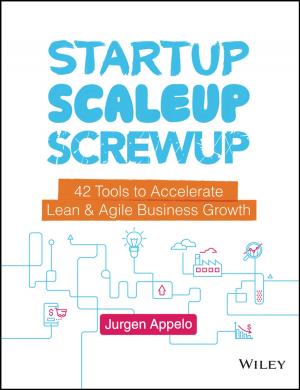Creative People Must Be Stopped
6 Ways We Kill Innovation (Without Even Trying)
Business & Finance, Management & Leadership, Management| Author: | David A Owens | ISBN: | 9781118129029 |
| Publisher: | Wiley | Publication: | October 7, 2011 |
| Imprint: | Jossey-Bass | Language: | English |
| Author: | David A Owens |
| ISBN: | 9781118129029 |
| Publisher: | Wiley |
| Publication: | October 7, 2011 |
| Imprint: | Jossey-Bass |
| Language: | English |
A framework for overcoming the six types of innovation killers
Everybody wants innovation—or do they? Creative People Must Be Stopped shows how individuals and organizations sabotage their own best intentions to encourage "outside the box" thinking. It shows that the antidote to this self-defeating behavior is to identify which of the six major types of constraints are hindering innovation: individual, group, organizational, industry-wide, societal, or technological. Once innovators and other leaders understand exactly which constraints are working against them and how to overcome them, they can create conditions that foster innovation instead of stopping it in its tracks.
The author's model of constraints on innovation integrates insights from the vast literature on innovation with his own observations of hundreds of organizations. The book is filled with assessments, tools, and real-world examples.
- The author's research has been featured in the New York Times, Wall Street Journal, London Guardian and San Jose Mercury News, as well as on Fox News and on NPR's Marketplace
- Includes illustrative examples from leading organizations
- Offers a practical guide for bringing new ideas to fruition even within a previously rigid organizational culture
This book gives people in organizations the conceptual framework and practical information they need to innovate successfully.
A framework for overcoming the six types of innovation killers
Everybody wants innovation—or do they? Creative People Must Be Stopped shows how individuals and organizations sabotage their own best intentions to encourage "outside the box" thinking. It shows that the antidote to this self-defeating behavior is to identify which of the six major types of constraints are hindering innovation: individual, group, organizational, industry-wide, societal, or technological. Once innovators and other leaders understand exactly which constraints are working against them and how to overcome them, they can create conditions that foster innovation instead of stopping it in its tracks.
The author's model of constraints on innovation integrates insights from the vast literature on innovation with his own observations of hundreds of organizations. The book is filled with assessments, tools, and real-world examples.
- The author's research has been featured in the New York Times, Wall Street Journal, London Guardian and San Jose Mercury News, as well as on Fox News and on NPR's Marketplace
- Includes illustrative examples from leading organizations
- Offers a practical guide for bringing new ideas to fruition even within a previously rigid organizational culture
This book gives people in organizations the conceptual framework and practical information they need to innovate successfully.















